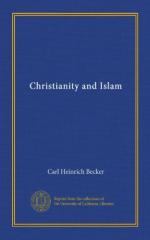In order to understand Muhammed’s attitude towards Christianity, we will examine in greater detail his view of this religion, the portions of it which he accepted or which he rejected as unauthentic. In the first place he must have regarded the Trinity as repugnant to reason: he considered the Christian Trinity as consisting of God the Father, Mary the Mother of God, and Jesus the Son of God. In the Qoran, God says, “Hast thou, Jesus, said to men, Regard me and my mother as Gods by the side of God?” Jesus replies, “I will say nothing but the truth. I have but preached, Pray to God, who is my Lord and your Lord” (5.116, f). Hence it has been inferred that Muhammed’s knowledge of Christianity was derived from some particular Christian sect, such as the Tritheists or the Arab female sect of the Collyridians who worshipped the Virgin Mary with exaggerated reverence and assigned divine honours to her. It is also possible that we have here a development of some Gnostic conception which regarded the Holy Ghost as of feminine gender, as Semites would do;[A] instances of this change are to be found in the well-known Hymn of the Soul in the Acts of Thomas, in the Gospel to the Egyptians and elsewhere. I am inclined, however, to think it more probable that Muhammed had heard of Mariolatry and of the “mother of God,” a title which then was a highly popular catchword, and that the apotheosis of Jesus was known to him and also the doctrine of the Trinity by name. Further than this his knowledge did not extend; although he knows the Holy Ghost and identifies him with Jesus, none the less his primitive reasoning, under the influence of many old beliefs, explained the mysterious triad of the Trinity as husband, wife, and son. This fact is enough to prove that his theory of Christianity was formed by combining isolated scraps of information and that he cannot have had any direct instruction from a Christian knowing the outlines of his faith.
[Footnote A: The word for “Spirit” is of the feminine gender in the Semitic languages.]
Muhammed must also have denied the divinity of Christ: this is an obvious result of the course of mental development which we have described and of his characteristically Semitic theory of the nature of God. To him, God is one, never begetting and never begotten. Denying the divinity of Jesus, Muhammed naturally denies the redemption through the Cross and also the fact of the Crucifixion. Yet, strangely enough he accepted the miraculous birth; nor did he hesitate to provide this purely human Jesus with all miraculous attributes; these were a proof of his divine commission, and marvellous details of this nature aroused the interest of his hearers.




